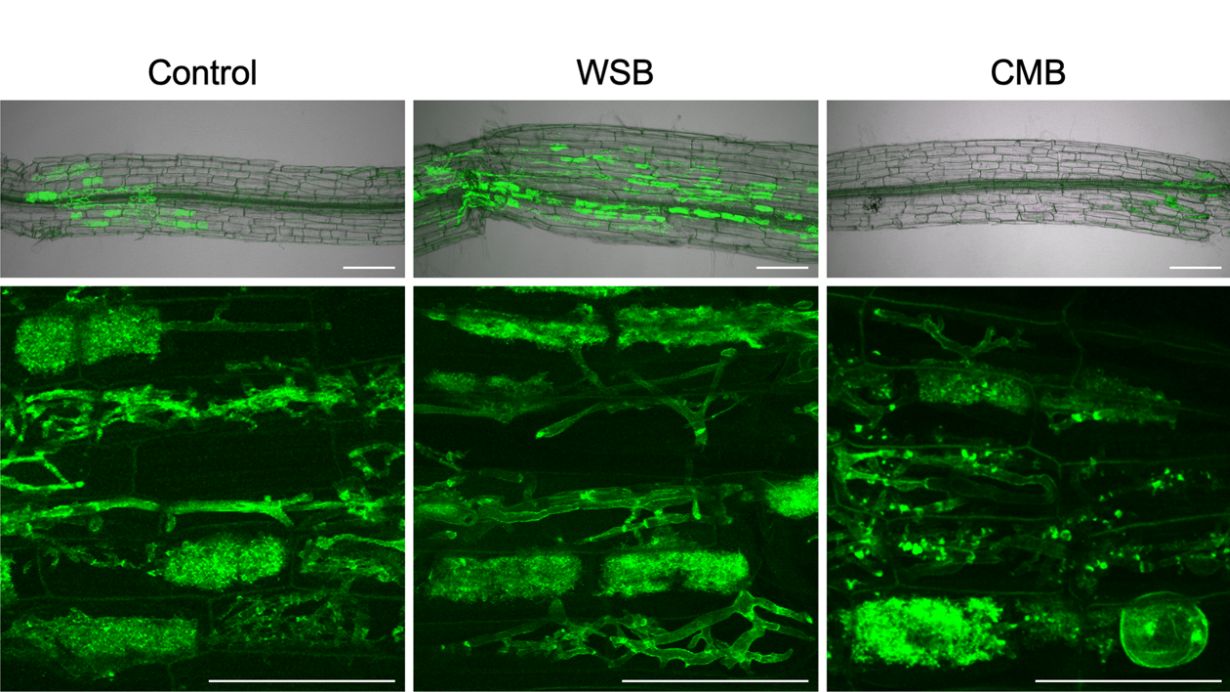Phosphorus is among the most frequently applied fertilizers worldwide, German agriculture alone consumes 115 thousand tons every year. However, natural phosphorus resources are dwindling. Biochar, a special plant coal produced when incinerating biomass, might be an alternative. As synergistic effects of biochar and widespread mycorrhizal fungi on plants have not yet been understood, researchers of Karlsruhe Institute of Technology (KIT) used gene expression analysis and found that the “response” of tomato seedlings to mycorrhizal symbiosis and, hence, their phosphate supply depend on the biochar basis. The results are published in Science of the Total Environment.
For some years now, biochar has been studied extensively as an alternative to phosphate fertilizer. Biochar is a recyclate produced by biomass pyrolysis, i.e. organic feedstocks are incinerated without oxygen at temperatures ranging from 400 to 700 degrees Celsius. The biochar bases may differ considerably. Waste wood, chicken manure, or leaves can be processed to fertilizers. Research in the past years revealed, however, that plants responded differently to biochars. Some grew better, others reacted as if they had not been fertilized at all, and others even were intoxicated by the biochar fertilizer.
An interdisciplinary team of KIT researchers from the Joseph Gottlieb Kölreuter Institute for Plant Sciences (JKIP) and the Institute for Technical Chemistry used tomato seedlings and found that the origin of the biochar biomass was crucial to symbiosis with arbuscular mycorrhizal fungi (AM fungi) existing in the soil.
In a first experiment, the team studied the effect of biochars made of wheat straw and chicken manure. The chicken manure biochar contained nine times as much phosphate as biochar based on wheat straw. Phosphate is the soluble form of phosphorus bonded to oxygen. It is a molecule essential to the growth of plants. “As expected, tomato seedlings fertilized with chicken manure biochar grew quickly and brilliantly,” says Professor Natalia Requena, expert of molecular phytopathology at JKIP. “Very much phosphate was available for direct processing.”
Symbiosis with AM Fungi Ensures Long-term Growth of the Plant
In a second experiment, researchers made AM fungi colonize the tomato plants. For more than 400 million years, these microfungi have been living on Earth in the roots of 80 percent of the land plants. They colonize the bark, take up phosphate, and transfer it to the plant. In turn, the plant supplies them with sugar and lipids.
When observing selected molecules, researchers found that the phosphate-rich biochar based on chicken manure impaired this symbiosis between tomato and AM fungi: Molecular exchange hardly took place. The biochar based on wheat straw did the opposite: The plant and microfungi developed an active symbiosis. “In the long run, plants fertilized with wheat straw biochar are more compatible with other microorganisms and protected much better against pathogens,” Requena explains. “We did not expect such a complex molecular response of the plants.”
Understanding the Cells Better – Fertilizing Less
The team used gene expression analysis to provide proof of these results: “This is a complex, expensive method, but it enables us to see what happens in the genes of the plant and which markers are triggered or not,” Requena says. Further experiments will be required to even better understand the response of plants. “When we will succeed to decode this response, we can program plants in the long term such that they need less phosphate and, hence, less mineral fertilizer,” Requena points out.
This research at KIT is financed from funds granted to the University of Excellence project KIT Future Fields “Plants fit for Future” (PffF). Within this project, researchers want to make plants fit for a future in which there will be a shortage of phosphorus fertilizers and pesticides will have been banned largely from the fields.
Original Publication
David Figueira-Galán, Stephanie Heupel, Glykeria Duelli, Marco Tomasi Morgano, Dieter Stapf, Natalia Requena: Exploring the synergistic effects of biochar and arbuscular mycorrhizal fungi on phosphorus acquisition in tomato plants by using gene expression analyses. Elsevier, 2023. https://doi.org/10.1016/j.scitotenv.2023.163506.
More Information:
On the research program “Plants fit for Future”
Complete Caption:
Comparison with the control plant (microscopy on the left) reveals that symbiosis with mycorrhizal fungi is stronger when tomato seedlings are fertilized with biochar based on wheat straw (center). When biochar based on chicken manure is used for fertilization, symbiosis is weaker (right). (Figure: JKIP, KIT)
In close partnership with society, KIT develops solutions for urgent challenges – from climate change, energy transition and sustainable use of natural resources to artificial intelligence, sovereignty and an aging population. As The University in the Helmholtz Association, KIT unites scientific excellence from insight to application-driven research under one roof – and is thus in a unique position to drive this transformation. As a University of Excellence, KIT offers its more than 10,000 employees and 22,800 students outstanding opportunities to shape a sustainable and resilient future. KIT – Science for Impact.

